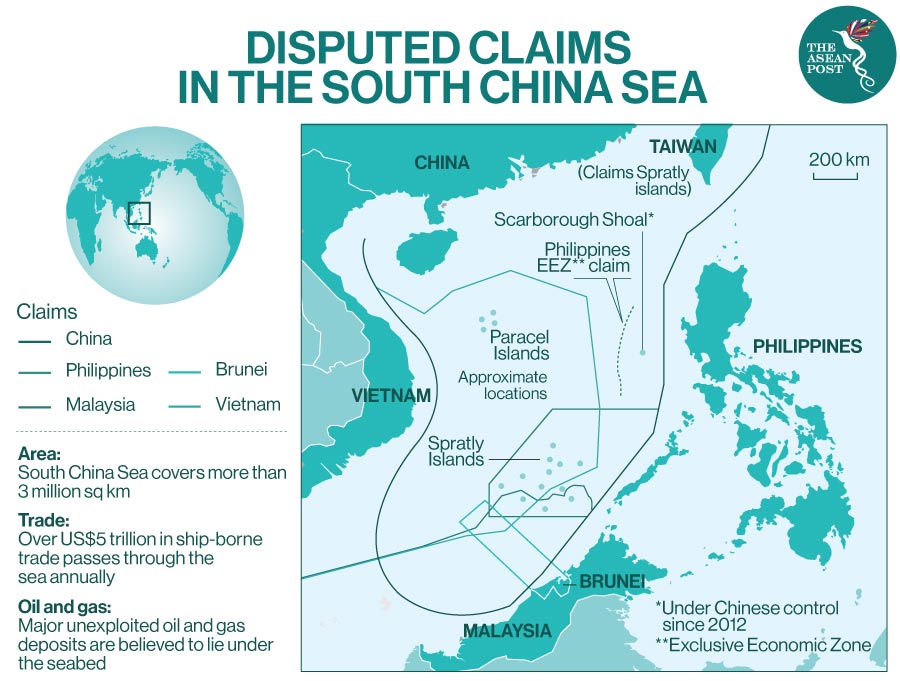More than seven years ago, in January 2013, the Philippines took the initiative of contesting the legal basis of China’s maritime claims in the South China Sea (SCS) through the Arbitral Tribunal at the Permanent Court of Arbitration (PCA) in The Hague under the compulsory dispute resolution provisions contained in the United Nations Convention on the Law of the Sea (UNCLOS).
On 12, July 2016, the Arbitral Tribunal released its ruling on the SCS arbitration in favour of the Philippines, denoting that China’s maritime claims in the SCS had no “legal basis.” The tribunal proclaimed that China’s “nine-dash line” claim over the SCS is without basis in international law and was not in accordance with the UNCLOS.
China immediately rejected the ruling and called it “null and void”. The ruling generated contrasting reactions between the citizens of both countries and prompted nationalist sentiments from both sides.
President Rodrigo Duterte was newly elected at the time and has a different foreign policy direction vis-à-vis his predecessor. Duterte wanted more improved Philippine-China relations to maximise the country’s economic and trade benefits. Thus, he tried to de-escalate the tension over the disputed waters between his country and China upon assuming office by not “taunting and flaunting” the tribunal ruling on the SCS.
If one will look closely, the arbitral ruling became a dilemma for the Duterte administration’s “constructive and more engaging foreign policy” towards China. Duterte had to be more creative in forging “friendly and constructive” relations with China without giving up its victory in the SCS arbitration. This precarious and difficult balancing act up is still a challenging endeavour to this day.
Moreover, on 28, August 2020, former Foreign Affairs Secretary Albert Del Rosario (ADR), former Senior Associate Justice Antonio Carpio and Former Ombudsman Conchita Carpio Morales issued a joint statement urging the Duterte administration to bring the Arbitral Ruling on the South China Sea (SCS) to the 75th Regular Session of the United Nations General Assembly (UNGA) at the UN Headquarters in New York on 15 September.
They expressed that, “Having lost so many opportunities by the shelving of the arbitral ruling since 2016, it is now in our highest national interest to bring this ruling on the South China Sea to the UNGA."
Carpio, Morales, and ADR said that Filipinos must not waste this chance to be heard. This is also an opportunity for the President to raise the arbitral ruling. They further explained in their joint petition that Duterte promised the Filipino people that he will raise the arbitral ruling at the “proper time”.
Is the timing right to raise the issue at the UNGA this September? What are the implications of such a move amid escalating tensions and the volatile situation in the SCS?
Dissenting Perspectives
The Foreign Secretary of the Philippines Mr. Teodoro Locsin Jr. on the other hand had already rejected the proposal to bring the arbitral ruling to the UNGA back in July. He said in a media interview that, “It doesn’t make sense. We won it already, why would you want to relitigate something that you won?”
He reiterated his position on Friday (28 August) in a media interview saying the Philippines will lose the vote because China would be able to win to its side the many small countries in the “Non-Aligned Movement” – which is a large voting bloc in the UN – with promises of development projects.

Locsin reiterated that “I will completely ignore his suggestion that we bring this to the United Nations, the arbitral award because when you win something, you do not appeal your victory. This is what Del Rosario wants me to do but I can’t. Because once you throw it to the United Nations, I’m afraid China has the numbers there and it’s about numbers. It’s not about law.”
On the other note, on Tuesday (2 September), Professor Butch Valdez, a former undersecretary of the Department of Education and a geopolitical analyst, in a webinar titled, “US-China Hybrid War (Trade, Tech, Media), Blending of Western-Eastern Values, Duterte's Independent Foreign Policy and How Filipinos Can Position to Benefit,” initiated by the Integrated Development Studies Institute (IDSI), a Manila-based think tank, presented a contrasting perspective to that of Carpio, Morales, and ADR.
“This is the situation, tension arising from the military confrontation between the US naval forces and the Chinese People Liberation Army (PLA) in the SCS increases by the day. I don’t understand why there are so many other people here (referring to the Philippines) still working on trying to talk about historical issues that will justify our territories when right now it seems to be very “academic and moot” because the two world powers are just about ready to shoot each other,” said Valdez.
Complex Realities
Amid the ongoing COVID-19 pandemic, as well as being in the middle of the rising economic, technological, and military tensions between China and the US, it would be imprudent and unwise to bring the PCA-Hague award to the 75th regular session of the UNGA. Any provocative move to this effect might backfire on the Philippines, placing the country in a more precarious situation with China then it already is.
One has to be aware of the reality that amid the rising tensions between China and the US over the SCS, the Philippines is somewhat caught in the middle amid the geopolitical dynamics surrounding the SCS. Firstly because of its strategic geopolitical position, and secondly, because of its delicate and important diplomatic ties to both countries, the US being a traditional ally and a friend of the Philippines, and the country’s reinvigorated friendship and somewhat blossoming diplomatic ties with China.
In this regard, the Philippines has to be very careful when navigating the geopolitical terrain and relations between these two countries to play a more constructive role and not to further complicate the already complex and tension-driven situation over the SCS.
Likewise, bringing the arbitral ruling at this time to the UNGA will not contribute positively to this “balancing act” neither will it reduce tensions between the two big powers surrounding the SCS. The timing is just not right. And in international politics or geopolitics for that matter, “right timing” is always of the essence and critical. Also, with the many challenges the country is faced with at the moment, it can’t afford another crisis.
Bringing the arbitral tribunal at this time to the UNGA may result in a downhill trajectory for China-Philippine relations and spark off economic and trade issues on both sides. If China-Philippine relations were to sour again just like during the previous administration, such a state of affairs might affect the safety and welfare of Overseas Filipino Workers (OFWs) in Hong Kong and mainland China. All these to a greater extent are not advantageous to the Philippines.
Furthermore, bringing the arbitral tribunal ruling to the UNGA is also somewhat futile. Consisting of 193 members where one country has one vote; apart from the approval of budgetary measures, UNGA decisions in the form of resolutions are at best a “recommendation”. Meaning, they have no binding power over member states. And in any case if the tribunal award is then brought to the UN Security Council (UNSC) on the pretext of “peace and security,” it will also be shot down as China is a permanent member of the UNSC.
Decision-making at the UNSC is by consensus and permanent members can veto any resolution. Thus, China can easily veto any resolution that goes against its sovereign interests. The only thing that can be achieved by bringing the tribunal award to the 75th session of the UNGA is, for the second time around, it will to some extent “shame” China once again on the international stage.
Nonetheless, this “shaming strategy” is futile as China will just absorb it like it did before when the arbitral award came out in July 2016 in favour of the Philippines. Bringing the arbitral award to the UNGA at this time will only trigger more diplomatic friction between China and the Philippines. It may also harden China’s resolve and accelerate its militarisation of the SCS as an act of deterrence.
Such a situation will only lead to a heightened “security dilemma” in the region and will intensify the prospects of military conflict in the SCS. All these factors taken as a whole will only further complicate the SCS situation.
The main dispute between China and the Philippines over competing territorial and maritime claims won’t be resolved, and relations between the two countries will be at their lowest. Thus, the Philippines must contend with these realities and navigate through them prudently and judiciously to protect itself and preserve its national interests.
Conclusion
Though the tribunal ruling is a milestone and nevertheless an overwhelming win on the part of the Philippines, it did not change and will not change the geopolitical situation surrounding the SCS in the foreseeable future. Thus, this situation calls for new thinking and probably revised or entirely different strategies.
Related Articles:

